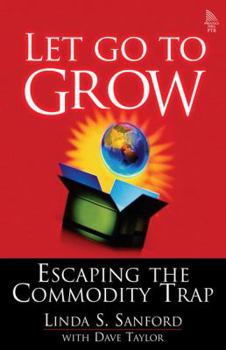Let Go to Grow: Escaping the Commodity Trap
Select Format
Select Condition 
Book Overview
Appropriate for all courses in deploying or managing service-centric datacenters, architectures, and IT infrastructures, as well as many courses focused on emerging trends in enterprise information... This description may be from another edition of this product.
Format:Hardcover
Language:English
ISBN:0131482084
ISBN13:9780131482081
Release Date:January 2005
Publisher:Prentice Hall PTR
Length:202 Pages
Weight:0.80 lbs.
Dimensions:0.9" x 6.3" x 9.4"
Customer Reviews
5 ratings
Let Go to Grow
Published by Thriftbooks.com User , 17 years ago
The author focuses on the difficulty that groups have accepting change. Her premise that letting go of old ways is a requirement for accepting new ways is spot on. I particularly appreciated that practical solutions that were outlined for dealing with recalcitrance of stakeholders. I found the book easy to read with little jargon and the writing style was light.
An outstanding book for leaders
Published by Thriftbooks.com User , 18 years ago
This business book shows the reader how to look at their business issues and gain an advantage over their competitors by embracing IBM's On Demand strategy. It encapsulates some of IBM's best thinking on how companies can position themselves for growth in today's highly competitive marketplace.
Let Go To Grow, A Timely Handbook
Published by Thriftbooks.com User , 18 years ago
My business was at a crossroads and this was very timely. I used it for strategic planning purposes and have actually begun to retool my business with the insights it provided. A definite read for anyone in a commodity business. All my folks thought it was one of the best reads of late.
Outstanding!
Published by Thriftbooks.com User , 18 years ago
First of all, a disclaimer - I know Linda Sanford and have worked with her at IBM for over 20 years, and I confess that I am a huge fan, so perhaps not entirely objective! That said, this book is too good an opportunity to pass up. Being in IBM, Linda is perhaps not as well known as 'star' CEO's like Meg Whitman - but if you look at her track record, its AMAZING! She's the one who brought back the IBM mainframe business from a near-death experience, and over the past several years has been working quietly and diligently to move IBM to be one of the leading companies in not just TALKING about the value of technology, but implementing it and proving the value propositions. This book has a lot of her quiet wisdom in it - and is highly worth a read!
The tighter you hold on, the more it all slips away...
Published by Thriftbooks.com User , 18 years ago
So what do you do when your main business offering is in danger of becoming a commodity item? Do you desperately cling to ever-shrinking profit margins in hopes of a turnaround, or do you take a radically different approach and open things up? Those questions and answers are discussed in a new book called Let Go To Grow - Escaping The Commodity Trap by Linda S. Sanford and Dave Taylor. Lots of food for thought here... Contents: Grow To Build Profits, Not Just Revenue; Commodity Markets Defined; It's All About Components; Creating Business Components; Integrate Your Business Components End-To-End; Expand Your Growth Space; Liberate Your Cost Structures; From Vision To Results - The Leadership Agenda; Achieving Measurable Productivity Improvements; Practical Implementation Of The Component Business Model; Gaining The Collaborative Edge - Building The Creative Company For The Creative Economy; Endnotes; Index With the globalization of today's business environment, it's a strong likelihood that your business offerings over time will drift (or run) to becoming a commodity. The margins will shrink along with your rate of growth. It's at that point that companies either flourish or stagnate. Sanford and Taylor make the case that by opening up your business to the use of components, as well as allowing your business to become a component in the business of others, you can create a value web that causes you and others to build whole new businesses in unique ways that were not part of the "original" plan created by holding on tight. They use examples like Li & Fung, a player in the apparel industry who can do everything from design to delivery. As a result, companies like J. C. Penny can partner with them and dramatically improve turnover, delivery, and inventory levels, all at lower cost. That allows J. C. Penny to concentrate on retailing. Another example is UPS. Rather than looking at themselves as just a commodity player in the package delivery space, they turned their business into components that other businesses could plug into. Because of that, UPS becomes a critical partner for many companies looking to better manage logistics, inventory, repair, etc. It's this "letting go to grow" which is the theme of the book, and it certainly makes a lot of sense when you step back and look at where things are going. Even though you may *think* your business isn't a target of commoditization, I'd be willing to bet you're not looking hard enough. Business executives owe it to themselves to read through this book and think about some restructuring that may be necessary to survive in the next few years...




